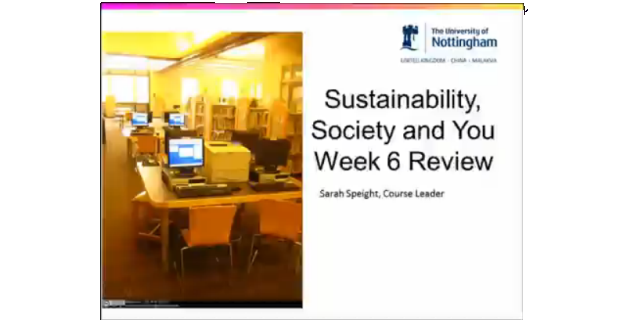
February 17, 2014, by Helen Whitehead
Learning sustainably and about sustainability
In week 6 of the Sustainability, Society and You course (which runs again later in the year) we looked at sustainable learning and learning for sustainability. There is evidence to suggest that online learning is sustainable in the sense of its environmental footprint (less travel, less printing out of learning materials, and fewer resources in maintaining physical spaces), although the energy footprint of online learning (all those computers!) concerned some.
Participants shared a number of technologies, applications and online resources that they believed were effective in teaching and learning sustainably and for sustainability.
These included
- Visual Aids – useful for the visual learner and something that technology is improving on all the time
- Ways for students to interact and collaborate such as Skype (for chatting and discussing learning materials in small groups), Twitter (“a great source of information and lots of people willing to help with identification and spread the word about environmental events and issues”) and Flickr.
- Radio is still of value for education in developing countries and others: “really radio learning enabled me to migrate into digital technology and online learning”
- Google Translate and other Google tools – “Translate is particularly helpful, it’s fast and provide a full list of various terms”. “Being able to gain a basic understanding of what someone is trying to say in a language that I do not know, is just fabulous”.
- Google Drive, and Groups: “The advantage is the shared availability, either for consultation or for collaboration”.
- Blog services allow categorization and tagging which enables students to search for relevant topics.
- Conceptboard, “useful for teachers and students alike, allowing us to sketch easily a concept or a schematic on something”.
- Wordle
Particular online education provision was mentioned.
- Open University courses: Sustainability is incorporated in the Design and Innovation courses: there are also Environmental courses enabling the learner to obtain a deep seeded attitude towards sustainability and International Development which heavily focuses on poverty and cultural issues linked to sustainability.
- Including OpenLearn
- FutureLearn and other MOOC providers whose courses participants had taken, such as EdX and Coursera
- TED and TEDx
- Khan Academy
- Encyclopedia Of Life
- iSPOT “iSpot is great. If you see a plant or animal or even a lichen whilst out and about in the city or the country and are wondering what it is, someone on iSpot seems to know!”
These are just a fraction of the resources and ideas that have been shared. We have posted as many as possible of the links shared on the course Delicious site, while blog and Twitter posts by the participants are collected on our Scoop.it page. Many thanks to all our engaged participants.
No comments yet, fill out a comment to be the first

Leave a Reply